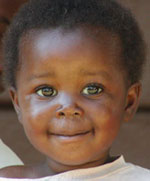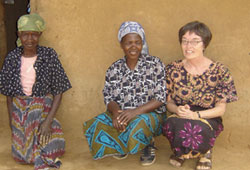A Matter of Life
Crushed by Poverty and Disease, Malawi's people yearn for hope
By Beverley Vantomme
March/April 2007
Return to Table of Contents
Print Article
Today a young mother came to our door, emaciated, hungry and seeking food. She had walked at least 15 kilometres. She lives with her grandmother and five-year-old child. Two weeks ago, her 10-month-old child died of anemia due to malaria and lack of nutrition. Her husband, she said, was now mentally ill and walking the streets. Alone, she had planted a garden of maize for food but had no money for fertilizer and so the crop failed.
Even with all her troubles, this young woman is a volunteer at a diocesan community youth construction project where my husband Ray accompanies the community volunteers. As a volunteer she receives a free small lunch. She is a joyous volunteer who works with a smile. It broke our hearts to see her frail condition, knowing how far she had walked to humbly ask "Mr. Ray" for food. Her desire to live and try as hard as she can for her small family's welfare is overwhelming. Hopefully she, her child and grandmother will live.
Today, Malawian village life is changing dramatically, largely due to the high death rate from HIV/AIDS. There are 80 percent less workers in the fields cultivating and planting. Crops in Malawi are labour intensive and it is women who now carry this heavy agricultural load. With the death of their husbands, women (some still children themselves, married as early as 11 years of age) have now become heads of households. Unable to complete their education, these women are disempowered and unprepared for the task of raising children and overseeing their agricultural needs or other income generating project. Some are also infected with HIV and their own physical and psychological status is fragile.
An unnecessary death
Deaths that would not occur in a developed country because of adequate nutrition and access to health care occur daily here in Malawi. On a recent visit to a township, I met one young girl, frail and emaciated, who was being treated for TB associated with HIV/AIDS. She was experiencing severe chest pain and persistent coughing. She was given some packets of a nutritious nut mixture, a few lentils and vitamins. She and other frail children and adults received fortified flour for porridge, and clothes from a Canadian shipping container. I felt that the next time we went to that township, she and many of the children we assessed that day will have likely died. I had an overwhelming sense of helplessness and later cried many tears for these precious lives.
 CREDIT: Betty Ann Martin
CREDIT: Betty Ann Martin
When accompanying the Home Based Care Team of St. John's Hospital, I meet many frail young children and adults who are HIV positive and often have TB. Numerous children have lost not only their parents and siblings, but their surrogate caregivers as well. Many of these children will die from poor nutrition and a lack of basic medication. Sadly most die lonely and isolated.
Free antiretrovirals for the treatment of HIV/AIDS can make a significant difference, albeit a fragile one due to the enormity of the need and the difficulty of maintaining a sustainable supply of these drugs from the Western world. With the antiretrovirals comes new life. Instead of being ostracized, judged and condemned, spirits are lifted and people have hope of realizing God's love and compassion in the fullness of life.
Many orphans are living with extended family who truly wish to care for them, yet the burden is great. Friends of ours with three children of their own are now raising 12 orphans as well. I meet many caregivers who are HIV positive and caring for orphans who are also HIV positive. These caregivers are just barely surviving and are physically, emotional and socially fatigued. The Home Based Care Team's monthly visits help to give them hope and dignity as human persons, created by God.
The youth Ray and I meet have few if any elders to encourage and guide them, or to provide the African family structure that in the past helped them to develop and mature. Employment is scarce and many young people migrate to the cities in search of a job and a chance in life, often to no avail.
Children as young as eight years of age are lost in the cities and become involved in an anti-social world of crime. Another manner of expressing their demoralization is to beg or prostitute themselves even for such basic needs as a piece of bread or a bar of soap. Those that are HIV positive have no physical, emotional or spiritual energy to envision hope. At times, desperate families send children to the cities to beg or access money any way they can. Child labour is a serious problem.
As secondary education is not free in Malawi, many young people cannot continue their education. Therefore they miss the opportunity to rediscover old ways or learn new ways of being healthy, of doing agriculture, of diversifying crops, of sound business practices to improve their lives and sustain themselves. Numerous young people come to our home to talk and to seek guidance. As they share their life situation with us, demoralization and despair are ever present in their words and in their hearts. These young people desperately need to feel and know that they are human persons who have potential and capability and who are worthy of respect and dignity.
There appears to be a growing understanding in the local communities of the need to equip and empower youth not only with occupational skills training but life skills in general, so that they can become confident, respectful and self sufficient.
We need to ask why
There are numerous local and international organizations focusing on growing indigenous crops, growing more than one crop per year, crop diversification, fertilizing with natural methods, introducing healthier foods that can be locally grown, replenishing the forests and watersheds, raising the status of women and working for gender equality – especially in the area of education and skills training, HIV/AIDS awareness, and many other visionary programs. Many of these programs have been functioning for years, yet change appears to be slow. We need to ask why.
We observe irrigation machinery in the large tea, coffee and tobacco estates, but not even simple, environmentally friendly irrigation in the many fields of the poor. We observe tractors cultivating large commercial maize and tobacco fields, but only hand labour in the fields of subsistence farmers. Why is this continuing?
There is a small but growing middle and upper class in the cities of Malawi. More and more new cars are on the roads and highways, larger homes on larger plots of lands, well-dressed women and men, and busy upcoming restaurants. One can be encouraged by signs of development. Yet only a small percentage of Malawians appear to be improving their standard of living, while a growing number of poor are becoming poorer. Why this incompatibility?
There are a multitude of aid agencies in Malawi, several have been here for years, yet Malawi continues to be one of the poorest countries in the world and donor dependent. We hear and sense that many Malawians have lost belief and hope in themselves and in their ability and potential to determine their own future, as they did in the time of their ancestors.
The enormity of the need is vast. Where do we begin to respond? As Scarboro missioners, we offer our presence, truly being with each person with caring, love, dignity and respect – gifts often lacking in their lives.
 Beverley Vantomme visits Phil and an elder at their villalge. Phil was Beverley's first student in Malawi studying to b a mental health worker and now works at the Rehabilitation Centre of St. John of god Community Services. Mzuzu.
Beverley Vantomme visits Phil and an elder at their villalge. Phil was Beverley's first student in Malawi studying to b a mental health worker and now works at the Rehabilitation Centre of St. John of god Community Services. Mzuzu.
Developed nations need to walk together with the people of Malawi in a spirit of equality, empowerment and caring for those who are vulnerable. We need to support and accompany the poor in Malawi in their own self-defined journey.
We in developed countries and here in Malawi who have education, wealth, power or prestige may have a tendency to close in on ourselves. We dissociate ourselves from the cry of the poor for equality, for education, for knowledge and skills, for employment opportunities, for independence, for autonomy and justice, and for solidarity. When we do not see or hear the cry of the poor, we simply cannot feel with them.
Are we inhibiting even one person from realizing the fullness of God's love and their own humanness? In doing so, are we hindering our own journey towards God and our own ability to experience the fullness of life?
Much has been reported about the poverty in Malawi and the many contributing factors: historical, political and economic (internal and external), agricultural, health, moral, social and cultural. As people of the wealthy nations, do we challenge unjust global economic structures that impact the poor in countries like Malawi and elsewhere?
We offer these few observations and reflections from our perspective as missioners living among the Malawi people. Yet, even after several years, we continue to experience powerful new learnings of life here in the north of Malawi and daily realize what we do not know or understand.
Beverley and Ray Vantomme will be leaving Scarboro Missions this year. They were first missioned to Malawi in January 1996, working in health care in collaboration with the St. John of God Hospitaller Brothers in Mzuzu.
Return to Table of Contents
Print Article